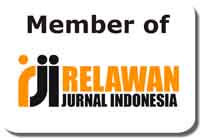Arabic Slang Language Use in Pesantren: An Interpretive Case Study
Abstract
Although research on the use of slang language has been widely studied, there is a paucity of studies that specifically looks at Arabic slang language among santri community in Indonesia. To fill such a void, the present study aims at examining the use of Arabic slang language among santri community in a modern pesantren in Southeast Sulawesi Province, Indonesia, and the factors that influence the use of such a language. Nested in an interpretive case study with data analyzed using Allan and Burridge’s (2006) slang language framework, the findings of this study suggest emerging types of slang used among the santri, which are in the forms of overlapping, clipping, acronyms, word-for-word translation, and the addition of local enclise elements. Such a language use was exclusively influenced by habits, creativity, and simplification in communication. Implications of the study show that the use of certain Arabic vocabulary can signal how a foreign language is acquired outside of the class
Keywords
Full Text:
PDFReferences
Abdelwahab Eltom RahmtAllah, E. (2020). The Familiarity of Internet Slang among EFL Female Learners in Saudi Arabia. International Journal of English Language Education, 8(2), 99. https://doi.org/10.5296/ijele.v8i2.17332
Adiantika, H. N. (2020). Contrastive Analysis between Indonesian and English Declarative Sentences. ELT in Focus, 3(1), 15–25. https://doi.org/10.35706/eltinfc.v3i1.3695
Allan, K., & Burridge, K. (2006). Forbidden words: Taboo and the censoring of language. Cambridge University Press.
Andrade, A. D. (2009). Interpretive research aiming at theory building: Adopting and adapting the case study design. The Qualitative Report, 14(1), 42.
Aziez, S. (2019). Verb Feature Differences in Indonesian and English Imperative Sentnces: A Contrastive Analysis Study. Lexeme : Journal of Linguistics and Applied Linguistics, 1(1), 1. https://doi.org/10.32493/ljlal.v1i1.2477
Baratovna, H. D. (2021). Youth Slang in the Speech of a Modern Student. Galaxy International Interdisciplinary Research Journal, 9(12), 272–276.
Batmang, B., & Gunawan, F. (2020). Issues of Social Values in the Arabic Teaching of Islamic Higher Education Students in Indonesia. Journal of Social Studies Education Research, 11(4), 235–256.
Bentley, H. W. (1935). Slang Today and Yesterday. American Speech, 61–65.
Boylu, E., & Kardaş, D. (2020). The views of teachers and students on slang in teaching Turkish as a foreign language. Journal of Language and Linguistic Studies, 16(1), 73–88.
Budiasa, I. G. (2021). Slang Language in Indonesian Social Media. Lingual: Journal of Language and Culture, 11(1), 30. https://doi.org/10.24843/LJLC.2021.v11.i01.p06
Comrie, B., Asher, R. E., & Simpson, J. M. Y. (1995). The Encyclopedia of Language and Linguistics. Language.
Creswell, J. W., & Creswell, J. D. (2017). Research design: Qualitative, quantitative, and mixed methods approaches. Sage publications.
Ding, S. L., Wu, C. C., & Goh, K. L. (2019). In quest of a new identity? Language Variation in Sabah. Lingua, 227, 102703.
Dumas, B. K., & Lighter, J. (1978). Is slang a word for linguists? American Speech, 53(1), 5–17.
Frazer, & Eble. (1998). Slang and Sociability: In-Group Language among College Students”; Félix Rodríguez González, “Slang and Sociability: In-Group Language among College Students. Journal of English Linguistics, 26(3), 247–265.
Győrffy, E. (2016). Slang Toponyms in Hungary: A Survey of Attitudes Among Language Users. In Names and Naming (pp. 153–162). Multilingual Matters.
Huda, K. (2018). A Contrastive Analysis of Interrogative Sentences in. Dar El-Ilmi: Jurnal Studi Keagamaan, Pendidikan Dan Humaniora, 5(2), 37–49.
Irawan, A. M. (2017). They are not Muslims’: A critical discourse analysis of the Ahmadiyya sect issue in Indonesia. Discourse & Society, 28(2), 162–181.
Karatsareas, P. (2021). From village talk to slang: the re-enregisterment of a non-standardised variety in an urban diaspora. Journal of Multilingual and Multicultural Development, 42(9), 827–839. https://doi.org/10.1080/01434632.2020.1767115
Kasriyati, D., & Rosidah, A. (2020). A Study on Students’ Understanding on Applying Declarative Sentence. Jurnal Smart, 6(1), 1–9. https://doi.org/10.52657/js.v6i1.972
Klerk, V. (1995). Slang in South African English. Language and Social History: Studies in South African Sociolinguistics, 265–276.
Lestari, A., Syamsudduha, S., & Usman, U. (2021). Interferensi Bahasa Bugis terhadap Bahasa Indonesia di Bank BRI Kantor Cabang Barru. TITIK DUA: Jurnal Pembelajaran Bahasa Dan Sastra Indonesia, 1(1), 70–80.
Longe, V. U. (1999). Student slang from Benin, Nigeria. English World-Wide, 20(2), 237–249.
Mustary, M., Iswary, E., & Hasjim, M. (2018). Penggunaan Bahasa Indonesia Dialek Makassar dalam Kegiatan Pembelajaran di SMA Negeri 6 Maros: Kajian Sosiolinguistik. JURNAL ILMU BUDAYA, 6(2), 230. https://doi.org/10.34050/jib.v6i2.4675
Namvar, F. (2014). The Use Of Slang Amongst Undergraduate Students Of A Malaysian Public University. JOURNAL OF ADVANCES IN LINGUISTICS, 3(1), 127–135. https://doi.org/10.24297/jal.v3i1.2067
Rosalina, R., Auzar, A., & Hermandra, H. (2020). Penggunaan Bahasa Slang di Media Sosial Twitter. Jurnal Tuah: Pendidikan Dan Pengajaran Bahasa, 2(1), 77–84.
Setiawan, H. (2019). The Slang Language in Street Food Court in Ponorogo Regency. Madah: Jurnal Bahasa Dan Sastra, 10(1), 137–148.
Suhardianto, S. (2016). Batam Teenagers’ Slang Language. Jurnal Perkotaan, 8(1), 23–35.
Thorne. (1997). Dictionary of Comtemporary Slang. Bloomsbury.
Ulandari, M. (2018). Bahasa Slang Dalam Komunitas Hallyu Wave. Bapala, 5(1).
Wang, Y. (2016). Study on campus slang from the perspective of semiotics. Theory and Practice in Language Studies, 6(3), 642.
Widawski, M. (2014). Lexical Creation in African American Slang. Academic Journal of Modern Philology, 3, 119–125.
Yin, R. K. (2003). Case study research: Design and methods (3rd ed., Vol. 5). Sage.
DOI: http://dx.doi.org/10.31332/lkw.v0i0.4558
Copyright (c) 2022 Batmang Batmang

This work is licensed under a Creative Commons Attribution-ShareAlike 4.0 International License.
Langkawi: Journal of The Association for Arabic and English indexed by:


















.png)
.png)

.png)
2.png)








